 |
 |
 |
 |
|
JANUARY 1939
24 January: Reinhardt Heydrich was ordered by Reichsmarschall Hermann Göring to speed up the emigration of Jews from Germany. 26 January: General Franco and his Fascist troops took Barcelona. 30 January: At the Reichstag Hitler declared the "extermination of the Jewish Race" in the case of a war. End of January: Odilo Globocnik lost his position as Gauleiter of Vienna (Wien). |
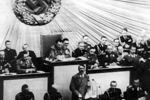 |
|
FEBRUARY 1939
14 February: Launching of the German battleship Bismarck in Hamburg. One week later Great Britain launched the battleship King George V. 21 February: Germany: The Nazis forced Jews to hand over all gold and silver items. 24 February: Hungary acceded to the anti-Soviet "Antikomintern Pact" of Germany, Italy, and Japan. 26 February: The London Palestine Conference broke down because of the negative attitude of the Jewish Agency under Chaim Weizmann. 27 February: End of the civil war in Spain. |
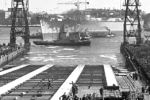 |
|
MARCH 1939
1 March: Only members of the German Nazi party NSDAP could become officials. 15 March: German troops occupied the "Rest-Tschechei" and entered Prague. 16 March: The German Foreign Minister v. Ribbentrop declared the "Reichsprotektorat Böhmen und Mähren" as part of the German Reich. 17 March: Chamberlain declared the end of Britain's Appeasement Policy. 28 March: Franco's troops entered Madrid. 31 March: Chamberlain guaranteed military help for Poland in case of a German attack. |
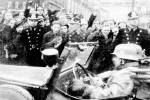 |
|
APRIL 1939
1 April: The Civil War ended in Spain. 7-8 April: Italian troops occupied Albania. 20-23 April: 4 days parade of the German Wehrmacht in Berlin on the occasion of Hitler's 50th birthday. 28 April: Hitler terminated the nonaggression treaty with Poland, and the Fleet Limiting Agreement with Great Britain. 30 April: The German Jews lost their rights as tenants and were relocated into Jewish houses. |
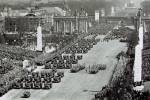 |
|
MAY 1939
15 May: Construction works for the Women-KZ Ravensbrück. 22 May: "Stahlpakt" between Germany and Italy (confirmation of the Berlin - Rome Axis). 24 May: T4 officials visited Grafeneck Castle in order to find out if the building could be used for gassing mental ill patients. 31 May: Germany signed a nonaggression treaty with Denmark. 930 Jewish refugees, crowded together in the ship "St. Louis", was turned away by Cuba, the U.S., and other countries and returned to Europe. |
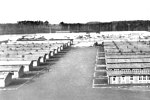 |
|
JUNE 1939
7 June: Germany signed a nonaggression treaty with Latvia and Estonia. 19 June: Members of the Hitlerjugend (HJ) were ordered to harvest service. 21 June: Decree about clearing the economy of Jews in the "Protektorat Böhmen und Mähren". 22 June: The USSR rejected France's and Great Britain's offer for cooperation against Hitler. |
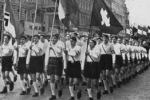 |
|
JULY 1939
4 July: The German Jews were ordered to establish the "Reichs Association of the Jews in Germany". Its purpose was to further the emigration of the Jews, and to care for their welfare and education. They were also denied the right to hold government jobs. 15 July: Compulsory military service was introduced in Great Britain. The first 30,000 persons liable for military service were called up in Great Britain. 21 July: Adolf Eichmann was appointed director of the Prague Office of Jewish Emigration. At the Reichskanzlei in Berlin the SS leader Viktor Brack informed selected professors of psychiatry about the euthanasia programme, and ordered them to join it. |
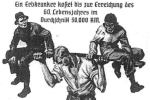 |
|
AUGUST 1939
2 August: Albert Einstein warned U.S. President Roosevelt that the Germans might be able to construct the atomic bomb. 18 August: Obligatory registration of all births of physically and mentally handicapped children. 23 August: Hitler - Stalin Pact. 24 July: Mutual assistance pact between Great Britain, France, and the USSR. 30 August: Mobilization in Poland. 31 August: Alleged attack of Polish soldiers on the radio station in Gliwice (Gleiwitz), carried out by disguised German SD members. 31 August: Mobilization of the British fleet; partial civilian evacuations from London. |
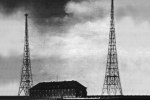 |
|
SEPTEMBER 1939
1 September: German troops invaded Poland, WW2 began. 1 September: In Germany Jews were forbidden to leave their homes after 8 p.m. in winter and 9 p.m. in summer. 1 September: Germans were forbidden to follow foreign radio programmes; it was punished with imprisonment. 1 September: Re-dated official permission for mercy killing. 2 September: A “camp for civilian war prisoners” (Zivilgefangenenlager) was established in Stutthof (near Gdansk). 3 September: Great Britain, France, Australia, and New Zealand declared war on Germany. The U.S., Spain, and Italy remained neutral. 3 September: Churchill was appointed member of the British War Cabinet. 3 September: Heinrich Himmler ordered the Einsatzgruppen to shoot all insurgents, defined as anyone who endangered German life or property. 4 September: Royal Air Force attacks on the German Navy. 4 September: Warsaw was cut off by the German Army. 6 September: South Africa declared war on Germany. 7 September: French troops occupied the Saarland. 10 September: Canada declared war on Germany. 13 September: Daladier became chief of the French War Cabinet. 15 September: First killings at the Owinska Mental Home (near Poznan / Poland). 17 September: The Soviet Union invaded the eastern part of Poland. 19 September: In Poland, the Poznan and Pomorze armies surrendered to the Germans. 19 September: German and Soviet forces met at Brest-Litovsk. 21 September: Heydrich issued an instruction to the chiefs of the Einsatzgruppen in Poland, in which he ordered the concentration of the Jews from the countryside into larger cities, and how to establish Judenräte. He also decided to deport the German Sinti and Roma to the Generalgouvernement. 22 September: Britain introduced gasoline rationing. 23 September: German Jews were forbidden to own wireless (radio) sets. 25 September: Introduction of food cards in Germany. 27 September: After the first systematic bombardment of a town (Warsaw) Polish troops in Warsaw surrendered. 27 September: Himmler created the RSHA, Heydrich became its chief. 28-29 September: Surrender of the Polish forces. Germany and the USSR reached an agreement about the new German-Soviet border in Poland. More than 2 million Jews resided in Nazi controlled areas, leaving 1.3 million in the Soviet area. 30 September: Establishment of the Polish Exile Government in Paris. General Wladyslaw Sikorski was made commander-in-chief. Oskar Schindler came to Krakow. Start of "Operation Tannenberg" ("Unternehmen Tannenberg"): An estimated 760 mass executions were carried out by Einsatzkommandos, resulting in the deaths of at least 20,000 of the most prominent Polish citizens. |
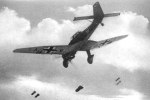 |
|
OCTOBER 1939
1 October: Establishment of the RSHA, led by Heydrich. 2 October: Countries from North and South America met (Pan-American Conference) to setup a neutrality zone 300 miles off the coast of America. 4 October: The Polish airforce flew its final mission. 6 October: Hitler proposed peace negotiations with the Western Allies, trying to revise the Versailles Treaty. They refused. 7 October: Hitler appointed Himmler "Reichskommissar für die Festigung des Deutschen Volkstums", and Himmler was given absolute control over the newly annexed Polish territories. 7 October: The British Expeditionary Force (BEF) landings ended in France. 8 October: The first decree creating a ghetto (considered unsuccessful by the Nazis) was issued in Piotrkow Trybunalski. 9 October: Hitler issued the War Directive No. 6, laying out the invasion of France, the Netherlands, and Belgium ("Plan Yellow"). 10 October: Herbert Lange became first commander of the KZ Fort VII in Poznan, but only until 16 October. Then he became head of the so called "Sonderkommando Lange" which carried out inspections of the mental homes in Owinska, Koscian, and Gniezno. 12 October: Establishment of the "Generalgouvernement" in the occupied Polish area which had not been annexed to the Reich. Hans Frank became "Generalgouverneur". 12 October: Evacuation of Jews from Vienna. 12 October: Frank was appointed Nazi Gauleiter (governor) of Poland. 13 October: The first attempt of combining German submarines into a "Wolfpack" failed. 14 October: Grafeneck Castle was confiscated by the T4 Organization. 14 October: A German submarine sank the British battleship Royal Oak in the Scapa Flow harbour. 16 October: German warships were ordered to torpedo Allied merchant ships without first giving warning. 17 October: Members of SS and the German police were excepted from public jurisdiction. 18 October: The Soviet Union invaded Estonia. 19 October: French troops retreated from the Saarland. 20 October: First deportation transport of Jews from Austria. 23 October: Yellow stars required to be worn by Polish Jews over age 10. 26 October: Parts of Poland were annexed to the Reich ("Reichsgau Posen" and "Westpreußen"). 26 October: All Polish men between 16 and 60 were ordered to serve in the "Arbeitsdienst" (Labour Service). The forced labour camp at 7 Lipowa Street in Lublin was set up. In the second half of October, the first mental ill patients were killed in Owinska (Poland). Christian Wirth was sent as a Kriminaloberkommissar and SS-Obersturmführer to the Grafeneck euthanasia centre. |
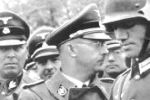 |
|
NOVEMBER 1939
8 November: Hitler escaped an attempt on his life, carried out by Georg Elser who had placed a hidden bomb in a pillar at the Bürgerbräu-Keller in München. 9 November: Globocnik was appointed "SS- und Polizeiführer für den Distrikt Lublin". 10 November: The Netherlands flooded its primary defensive area. 11 November: 78 children from the mental home in Owinska were sent to death in a primitive gas chamber at Fort VII in Poznan. 14 November: Issue of clothing cards in Germany. 16 November: Martial Law was declared in Czechoslovakia. 17 November: The Czechoslovakia National Committee was set up in France. 18 November: Frank issued an order for the establishment of a Judenrat in each municipality, and ordered the Krakow Jews (at first) to wear an armband. 23 November: Yellow stars required to be worn by Polish Jews over 10 years. 29 November: First killings at the Kocborowo mental home (Poland). 29-30 November: Soviet attack on Finland. 30 November: Helsinki was bombed by Soviet aircrafts. All Jewish bank accounts in the Generalgouvernement were blocked. |
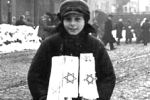 |
|
DECEMBER 1939
1 December: Start of the resettlement of 150,000 Jews of the Poznan area to the Generalgouvernement. 5 December: Soviet forces reached the "Mannerheim Line" in Finland. 14 December: The League of Nations expelled the Soviet Union. 17 December: The German battleship Admiral Graf Spee was scuttled by its captain Langsdorff at the entrance of Montevideo harbor in Uruguay. 20 December: Last killings at the mental homes in Owinska and Kocborowo (Poland). 23 December: The first Canadian troops landed in Great Britain. 27 December: Finnish counter-offensive against the USSR. 28 December: Meat rationing in Great Britain. Eichmann took over the RSHA section IV B4 dealing solely with Jewish affairs and evacuations. First experiences with gas vans took place in Poland from late 1939 until June 1940. |
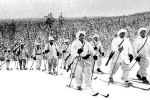 |
© ARC 2006